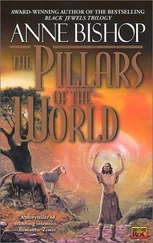“Don’t tell me how to manage my affairs, Tom Builder,” said William. “You’re all dismissed.” He twitched a rein, but Tom had hold of the bridle. “Let go of my horse,” William said dangerously.
Tom swallowed. In a moment William would try to get the horse’s head up. Tom felt in his apron pocket and brought out the crust of bread he had been eating. He showed it to the horse, which dipped its head and took a bite. “There’s more to be said, before you leave, my lord,” he said mildly.
William said: “Let my horse go, or I’ll take your head off.” Tom looked directly at him, trying not to show his fear. He was bigger than William, but that would make no difference if the young lord drew his sword.
Agnes muttered fearfully: “Do as the lord says, husband.”
There was dead silence. The other workmen stood as still as statues, watching. Tom knew that the prudent thing would be to give in. But William had nearly trampled Tom’s little girl, and that made Tom mad, so with a racing heart he said: “You have to pay us.”
William pulled on the reins, but Tom held the bridle tight, and the horse was distracted, nuzzling in Tom’s apron pocket for more food. “Apply to my father for your wages!” William said angrily.
Tom heard the carpenter say in a terrified voice: “We’ll do that, my lord, thanking you very much.”
Wretched coward, Tom thought, but he was trembling himself. Nevertheless he forced himself to say: “If you want to dismiss us, you must pay us, according to the custom. Your father’s house is two days’ walk from here, and when we arrive he may not be there.”
“Men have died for less than this,” William said. His cheeks reddened with anger.
Out of the corner of his eye, Tom saw the squire drop his hand to the hilt of his sword. He knew he should give up now, and humble himself, but there was an obstinate knot of anger in his belly, and as scared as he was he could not bring himself to release the bridle. “Pay us first, then kill me,” he said recklessly. “You may hang for it, or you may not; but you’ll die sooner or later, and then I will be in heaven and you will be in hell.”
The sneer froze on William’s face and he paled. Tom was surprised: what had frightened the boy? Not the mention of hanging, surely: it was not really likely that a lord would be hanged for the murder of a craftsman. Was he terrified of hell?
They stared at one another for a few moments. Tom watched with amazement and relief as William’s set expression of anger and contempt melted away, to be replaced by a panicky anxiety. At last William took a leather purse from his belt and tossed it to his squire, saying: “Pay them.”
At that point Tom pushed his luck. When William pulled on the reins again, and the horse lifted its strong head and stepped sideways, Tom moved with the horse and held on to the bridle, and said: “A full week’s wages on dismissal, that is the custom.” He heard a sharp intake of breath from Agnes, just behind him, and he knew she thought he was crazy to prolong the confrontation. But he plowed on. “That’s sixpence for the laborer, twelve for the carpenter and each of the masons, and twenty-four pence for me. Sixty-six pence in all.” He could add pennies faster than anyone he knew.
The squire was looking inquiringly at his master. William said angrily: “Very well .”
Tom released the bridle and stepped back.
William turned the horse and kicked it hard, and it bounded forward onto the path through the wheat field.
Tom sat down suddenly on the woodpile. He wondered what had got into him. It had been mad to defy Lord William like that. He felt lucky to be alive.
The hoofbeats of William’s war-horse faded to a distant thunder, and his squire emptied the purse onto a board. Tom felt a surge of triumph as the silver pennies tumbled out into the sunshine. It had been mad, but it had worked: he had secured just payment for himself and the men working under him. “Even lords ought to follow the customs,” he said, half to himself.
Agnes heard him. “Just hope you’re never in want of work from Lord William,” she said sourly.
Tom smiled at her. He understood that she was churlish because she had been frightened. “Don’t frown too much, or you’ll have nothing but curdled milk in your breasts when that baby is born.”
“I won’t be able to feed any of us unless you find work for the winter.”
“The winter’s a long way off,” said Tom.
They stayed at the village through the summer. Later, they came to regard this decision as a terrible mistake, but at the time it seemed sensible enough, for Tom and Agnes and Alfred could each earn a penny a day working in the fields during the harvest. When autumn came, and they had to move on, they had a heavy bag of silver pennies and a fat pig.
They spent the first night in the porch of a village church, but on the second they found a country priory and took advantage of monastic hospitality. On the third day they found themselves in the heart of the Chute Forest, a vast expanse of scrub and rough woodland, on a road not much broader than the width of an ox cart, with the luxuriant growth of summer dying between the oaks on either side.
Tom carried his smaller tools in a satchel and slung his hammers from his belt. He had his cloak in a bundle under his left arm and he carried his iron spike in his right hand, using it as a walking stick. He was happy to be on the road again. His next job might be working on a cathedral. He might become master mason and stay there the rest of his life, and build a church so wonderful it would guarantee that he went to heaven.
Agnes had their few household possessions inside the cooking pot which she carried strapped to her back. Alfred carried the tools they would use to make a new home somewhere: an ax, an adz, a saw, a small hammer, a bradawl for making holes in leather and wood, and a spade. Martha was too small to carry anything but her own bowl and eating knife tied to her belt and her winter cloak strapped to her back. However, she had the duty of driving the pig until they could sell it at a market.
Tom kept a close eye on Agnes as they walked through the endless woods. She was more than halfway through her term now, and carrying a considerable weight in her belly as well as the burden on her back. But she seemed tireless. Alfred, too, was all right: he was at the age when boys have more energy than they know what to do with. Only Martha was tiring. Her thin legs were made for the playful scamper, not the long march, and she dropped behind constantly, so that the others had to stop and wait for her and the pig to catch up.
As he walked Tom thought about the cathedral he would build one day. He began, as always, by picturing an archway. It was very simple: two uprights supporting a semicircle. Then he imagined a second, just the same as the first. He pushed the two together, in his mind, to form one deep archway. Then he added another, and another, then a lot more, until he had a whole row of them, all stuck together, forming a tunnel. This was the essence of a building, for it had a roof to keep the rain off and two walls to hold up the roof. A church was just a tunnel, with refinements.
A tunnel was dark, so the first refinements were windows. If the wall was strong enough, it could have holes in it. The holes would be round at the top, with straight sides and a flat sill-the same shape as the original archway. Using similar shapes for arches and windows and doors was one of the things that made a building beautiful. Regularity was another, and Tom visualized twelve identical windows, evenly spaced, along each wall of the tunnel.
Tom tried to visualize the moldings over the windows, but his concentration kept slipping because he had the feeling that he was being watched. It was a foolish notion, he thought, if only because of course he was being observed by the birds, foxes, cats, squirrels, rats, mice, weasels, stoats and voles which thronged the forest.
Читать дальше












